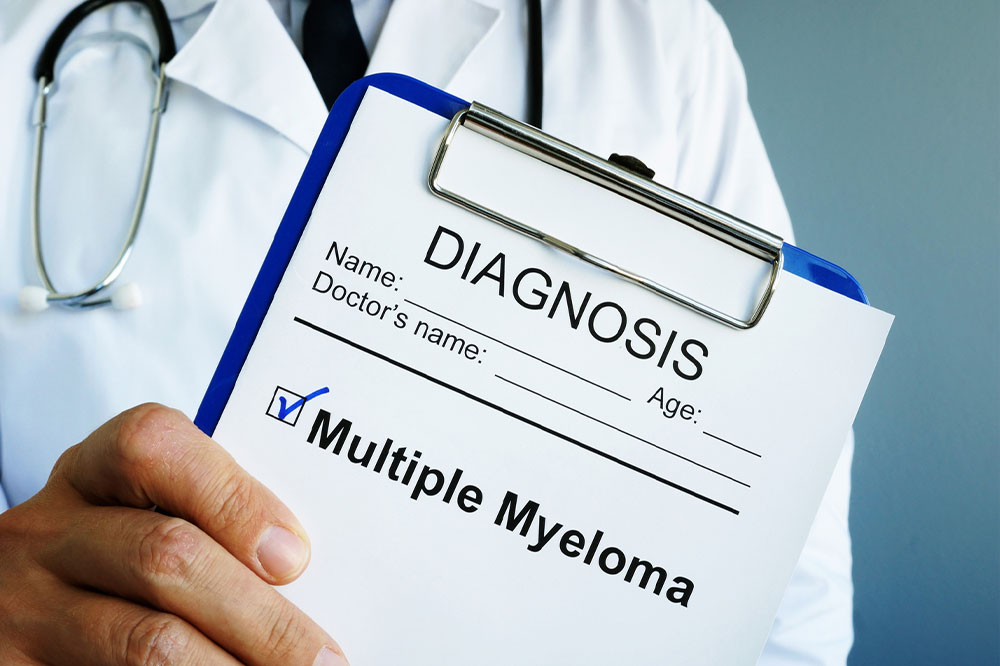Multiple Myeloma – Signs and Nutritional Choices

Exhaustion, shortness of breath, and persistent pain in the back or elsewhere in the body are potential signs of multiple myeloma—a common type of cancer that affects the bone marrow. Sadly, many people overlook these symptoms, leading to a delayed diagnosis and treatment. This blog takes a closer look at the signs of multiple myeloma and the foods one should eat and avoid with this condition for a better prognosis.
What is multiple myeloma?
Multiple myeloma is a variation of blood cancer that develops in the plasma cells of the bone marrow. These cells are responsible for producing antibodies to ward off infection and disease. When affected by this condition, plasma cells become abnormal and divide rapidly. They crowd out healthy blood cells with time, damaging surrounding bones, organs, and tissues. Sometimes, they also form tumors in the bone marrow and other body parts. The tumors can cause bone pain, weakness, fractures, and other symptoms like fatigue, recurrent infections, and anemia.
What causes multiple myeloma is not fully understood, but genetics, environment, and lifestyle are said to play a role. Cumulative exposure to radiation, especially ionizing radiation, has been suggested as a prevalent cause. Research has also highlighted that age and gender are potential risk factors; the condition is more likely to affect people over 65, and men are more likely to develop it than women.
Signs of multiple myeloma
The following are a few symptoms that might help identify the condition. Those who experience these should visit a healthcare expert for further investigation into the cause:
Numbness or tingling
Multiple myeloma can sometimes cause nerve damage, leading to numbness or tingling in the hands or feet.
Skin lesions or rashes
In rare cases, one may experience itchy, painful, or discolored lesions (abnormal tissue growth) and rashes on the skin.
Blood clots
The disorder can increase the risk of blood clots, leading to swelling, pain, or redness in the affected area. The swelling may also cause pain.
Loss of appetite
Individuals with multiple myeloma may experience extreme fatigue and decreased energy levels. The tiredness can, in turn, lead to changes in eating habits, such as loss of appetite and indigestion.
Frequent urination
When affected by this disorder, the plasma cells release more serum light chain proteins. This decreases the kidney’s ability to reabsorb water, leading to frequent urination. The problem can be highly uncomfortable and disabling for some, interfering with sleep and everyday activities.
Foods to manage the symptoms
Besides treatment, a healthy meal plan is crucial for managing cancer. The following foods have nutrients that help combat the disease and support ongoing treatment:
Green leafy vegetables
Green leafy vegetables, such as spinach, kale, and broccoli, are rich in antioxidants, vitamins, and minerals that help strengthen the immune system and reduce inflammation. They also contain a compound called sulforaphane, which has been shown to have anti-cancer properties.
Turmeric
Turmeric is a spice with anti-inflammatory and anti-cancer properties. Research suggests that a compound called curcumin in it may help slow the growth and spread of cancer cells in multiple myeloma.
Berries
Berries, such as blueberries, raspberries, and strawberries, are rich in antioxidants, which help protect cells from damage and reduce inflammation. They are also a good source of fiber, a nutrient that helps regulate blood sugar and promote digestive health.
Whole grains
Whole grains, such as brown rice, quinoa, and whole-wheat bread, are good sources of fiber and other nutrients that help promote overall health and lower inflammation.
Fatty fish
Fatty fish, such as salmon, mackerel, and sardines, are a good source of omega-3 fatty acids that have anti-inflammatory properties. These fish also contain vitamin D, which helps promote bone health.
Foods to avoid with the condition
While some foods help combat multiple myeloma, certain others can increase the risk of developing the disease and aggravate the symptoms:
Processed meats
Processed and packed meats like hot dogs and bacon are high in nitrates and nitrites—preservatives linked to increased cancer risk. They are also high in saturated fat, which raises inflammation and aggravates the symptoms.
Sugary foods and drinks
Foods and beverages high in added sugars, such as candy, soda, and baked goods, can cause blood sugar spikes and inflammation, worsening the symptoms and interfering with ongoing treatment.
Red meat
Red meats, such as beef and lamb, are high in saturated fat, which can increase inflammation. Some studies also suggest that food plans that include too much red meat may raise the risk of certain cancers.
Fried and fatty foods
Fried and high-fat items, such as French fries, fried chicken, and potato chips, are loaded with saturated and trans fats, which can increase inflammation and worsen the symptoms. Moreover, they are usually low in nutrients.
What is relapsed refractory multiple myeloma?
Relapsed refractory multiple myeloma (RRMM) is a type of multiple myeloma that keeps recurring after treatment (relapsed) or does not respond to treatment (refractory). It is sometimes called a progressive or end-stage disease because it is hard to treat. The disease’s characteristics are the same: uncontrolled production of abnormal white blood cells, bone and organ damage, and anemia. Treatment for RRMM typically includes stem cell transplants and cutting-edge therapies like CAR T-cell therapy.
Multiple myeloma is a chronic disease that cannot be cured. However, treatment can help slow its progression and make the symptoms manageable. Those who experience the signs of the disorders should consult a doctor regularly and monitor their discomfort. Eating the right foods and avoiding the wrong ones is also essential. If unsure, a nutritionist can suggest changes in the meal plan for dealing with multiple myeloma. Long-term health disorders like cancer may also take a toll on a person’s emotional health, so patients should connect with their friends and family and seek professional support if necessary.



